IRGC Chief Says ‘Scared’ Enemies Asking Iran Not To Attack Them
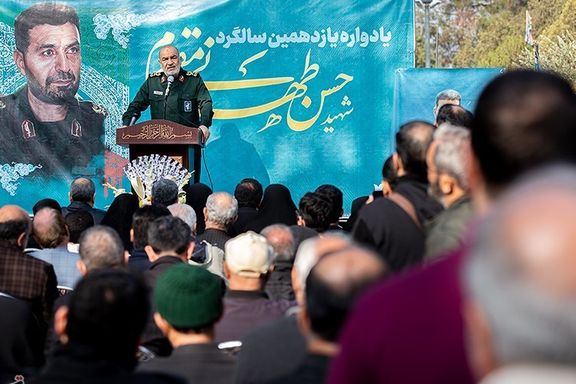
Commander of Iran's Revolutionary Guard Hossein Salami has threatened the Islamic Republic's “enemies,” claiming that they are frightened and on alert mode.

Commander of Iran's Revolutionary Guard Hossein Salami has threatened the Islamic Republic's “enemies,” claiming that they are frightened and on alert mode.
Salami made the remarks during a ceremony to commemorate the 11th death anniversary of Hassan Tehrani Moqaddam, one of Iran’s earliest missile architects, who was killed when a huge explosion rocked a missile base 30 miles from Tehran in November 2012.
Moghaddam was among 17 top IRGC officers killed that day, in what many believed was an operation by Israeli intelligence. The incident was so shocking that even Supreme Leader Ali Khamenei attended the funeral at the time.
Salami said that "the enemies" are sending regular messages to Iran, pleading not to be targeted by a military response, without specifying which enemies. “Now it is a number of days that enemies do not have peace and are on alert.
Since popular protests began in Iran, the clerical regime has threatened Western countries and Saudi Arabia, claiming they are behind the unrest. The IRGC commander added, “Those sitting in glass houses in Riyadh, Tel Aviv, New York, and Paris are designers of riots.”
Salami added that “we targeted the anti-revolution [groups] in the Iraqi Kurdistan region, held a major military drill along Aras River, launched a satellite-carrying rocket, tested Bavar 373 missile system with a range of 300km, and we announced yesterday that we have developed a new missile that no missile defense system is able to confront it.”
“Enemies should know that if they targeted one of us, we will target all of them,” referring to the killing of IRGC’s Quds (Qods) commander Qasem Soleimani. “You targeted our Qasem but we will target all of you and expel you from the region,” he maintained.
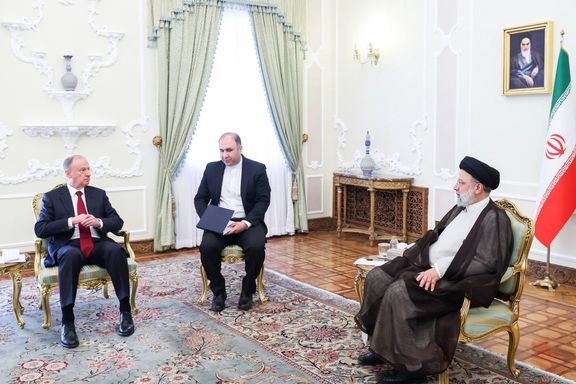
US State Department Thursday voiced concern over expanding ties between Russia and Iran, calling it a “deepening alliance” after Tehran’s drone supplies to Moscow.
Department spokesperson Ned Price answering a question during his press briefing about the visit of Russia’s national security council secretary Nilolai Patrushev to Iran this week, said, “All of this is a concern in the context of the partnership – in some ways the burgeoning partnership – that we’ve seen develop in recent years and in different ways in recent months between Iran and Russia. This is a deepening alliance that the entire world should view as a profound threat.“
Patrushev held meetings with his Iranian counterpart Ali Shamkhani and President Ebrahim Raisi on November 9, discussing their "strategic partnership".
Price referring to Iranian drones used by Russia against Ukraine said that the US is working with the international community "to address the threats that are posed by Russia and Iran separately and the cooperation…between the two of them, including Iran’s dangerous proliferation of weapon systems to Russia."
Price also reiterated concern over Russia possibly helping Iran with knowledge of how to suppress protests but did not share any evidence of such cooperation.
A reporter asked Price during his briefing for more details about an initial statement two weeks ago that Russia may be helping Iran to suppress demonstrators.
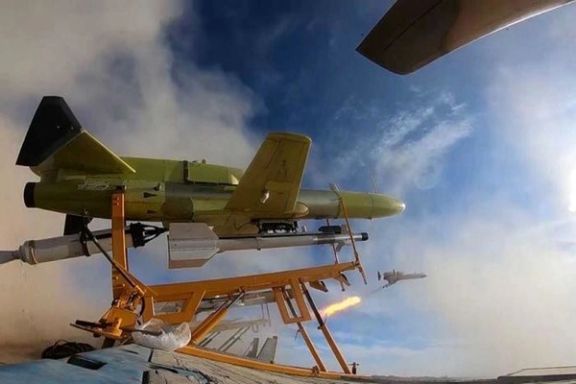
“Unfortunately, there’s nothing more I can provide,’ Price responded adding that “In some instances we’re able to provide additional detail, including as we’ve done with the transfer of weapons. In this case it was the broader point that there are indications that this knowledge may be shared.”
Price went on to say that both Russia and Iran “have a good deal of experience when it comes to repression. They have both demonstrated their effectiveness when it comes to their ability to repress their people…our concern is that they will share this knowledge and that they will attempt to optimize those practices.”
Russia is a signatory of the 2015 nuclear accord known as the JCPOA and played an active role during 18 months of negotiations in Vienna initiated by the Biden Administration immediately after coming to office. But ultimately Iran presented demands unacceptable for Washington and the talks reached a dead-end in August, as Tehran was delivering military drones to Moscow.
In the meantime, Iran continues to expand its nuclear program with enriching more uranium, with having stockpiled 62 kilograms of fissile material enriched at 60 percent, enough for one nuclear weapon. The UN nuclear watchdog, the IAEA confirming this development voiced concern on Thursday [Nov. 10].
Iran is also expanding its missile program, with testing its ballistic missiles with space launches and developing new weapons.
A top Iranian commander announced Thursday that Tehran has developed hypersonic ballistic missile.
"This missile has a high speed and can maneuver in and out of the atmosphere. It will target the enemy's advanced anti-missile systems and is a big generational leap in the field of missiles," commander Amir-Ali Hajizadeh was quoted as saying.
IAEA’s chief Rafael Grossi pointing to this announcement said during the United Nations COP27 climate meeting in Egypt that “We see that all these announcements increase the attention, increase the concerns, increase the public attention to the Iranian nuclear program.”

A German member of European Parliament has vehemently slammed Iranian lawmakers for demanding the execution of protesters, saying all these MPs must be sanctioned.
Hannah Neumann said during a parliament session on Thursday said that people of Iran are being brutally suppressed by their own regime “and it is not accepted by us.”
“Protesters are beaten-up, raped and killed in the streets and in prisons, not by criminals but by those who claim to be the government of this wonderful country,” she added.
Speaking during a session she went on to say that out of the 290 members of the Iranian parliament 227 called on the country’s judiciary to severely punish protesters and political prisoners, including with issuing death sentences.
Neumann called on her colleagues in the European Union to send a very strong signal that such moves are not accepted.
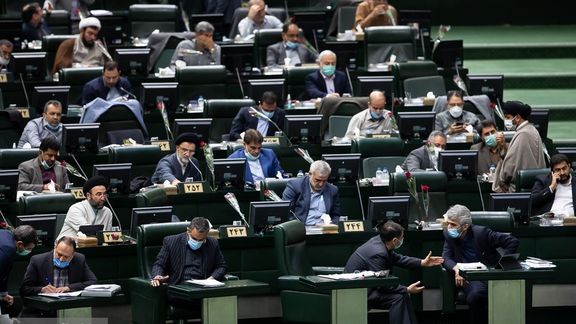
She also urged them to impose targeted sanctions against these 227 Iranian lawmakers.
Neumann stated that the EU is right now preparing a sanctions package to be issued by the Foreign Affairs Council next Monday, but “this package has only 31 individuals,” so a debate must be held to include all these Iranian parliamentarians.
A group of 227 parliament members in Iran called on the Judiciary Sunday to issue death sentences for people arrested during the ongoing antigovernment protests.
In a statement that was read out in the Iranian parliament on Sunday, the lawmakers called the protesters ‘Mohareb’ -- which literally means warrior in Arabic, but in Islamic law or sharia it means ‘enemy of God’ that carries the death penalty.

Two US B-52H Stratofortress bombers flew over the Middle East , in a multilateral drill with partner air forces in the region, CENTCOM announced on Thursday.
“This Bomber Task Force mission demonstrates our commitment to regional security and the collective capabilities of our military partners in the region,” CENTCOM commander Gen. Michael “Erik” Kurilla said. “CENTCOM has the ability to very quickly put a significant amount of combat power in the air alongside our partners.
A press release by CETCOM did not specify the exact date and time of the bomber mission.
The US Air Force periodically sends B-52 bombers to fly over the region both as a show of force and resolve, as well as a coordinating exercise with air forces of partner nations, such as Israel and some Arab states.
However, the latest drill was the first of what CENTCOM called "multilateral use of Transverse," a program that "enhances partner nations' operational situational awareness."
“This Bomber Task Force is a clear reflection of enduring U.S. commitment to the region,” said Lt. Gen. Alexus Grynkewich, Ninth Air Force (Air Forces Central) commander. “Together with our partners, we can rapidly inject overwhelming combat power into our common operating area.
The bombers came from the 2nd Bomb Wing at Barksdale Air Force Base, Louisiana and integrated their mission with 13 partner nation air forces.
CENTCOM also said that Gen. Kurilla held one-on-one discussions on "matters of mutual importance" with top military leaders of partner nations in the region, Bahrain, Egypt, Israel, Kuwait, Lebanon, Oman, Qatar, Saudi Arabia, the United Arab Emirates and Yemen.
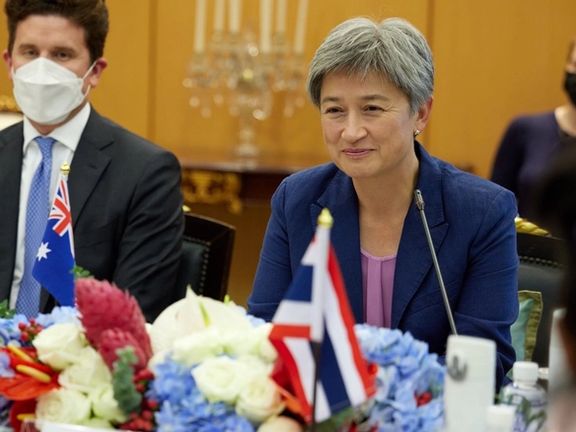
Australia’s foreign minister Penny Wong has condemned the deadly and disproportionate use of force against protesters in Iran.
In a statement on Thursday, Wong said the Australian government has been “alarmed” by reports that hundreds of people have been killed and many more injured, including dozens of children, as a result of the “heavy-handed” measures Iranian authorities have implemented to crack down on ongoing protests.
She added that Australia supports the right of the Iranian people to protest peacefully and “calls on Iranian authorities to exercise restraint in response to ongoing demonstrations.”
“Iran's human rights record has been a longstanding and serious concern for Australia, and we have repeatedly raised our concerns with Iran in Canberra, Tehran, and multilateral forums,” she went on to say.
She also reiterated that Australia joined Canada and New Zealand in expressing grave concerns about the situation in Iran to the United Nations Security Council, including Iran's position on the UN Commission on the Status of Women.
“Australia stands with Iranian women and girls in their struggle for equality and empowerment, and we will continue to call on Iran to cease its oppression of women. We are committed to promoting gender equality, women's empowerment, and ending violence against women and girls worldwide,” reads her statement.
Earlier, Australian Prime Minister, Anthony Albanese condemned the crackdown by Iranian authorities and urged the Islamic Republic to respect the rights of protesters.
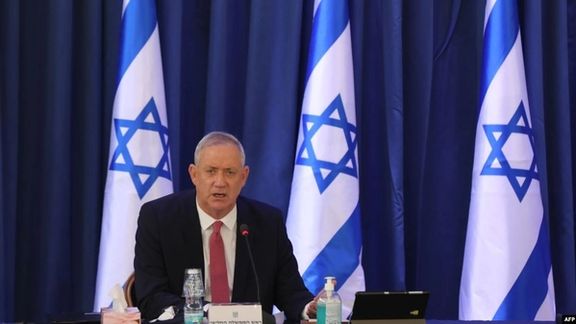
Outgoing Defense Minister Benny Gantz has trumpeted the prospect of an Israeli military attack on Iran’s expanding nuclear facilities.
Gantz told a press briefing Wednesday that Israel had prepared “long-term processes I don’t want to elaborate on.” Gantz claimed the last time Israel was so ready for striking Iran was when he was chief of staff in 2012 and then prime minister Benjamin Netanyahu rejected the option.
With Netanyahu set to return to office after November 1 parliamentary elections, Gantz said he expected Likud leaders would now “act with judgment.” The outgoing government led by Naftali Bennett and Yair Lapid has since taking office in June 2021 argued Netanyahu had left Israel ill-prepared for an attack on Iran.
Israel’s leaders have all criticized efforts to revive the 2015 Iran nuclear agreement, which restricted Tehran’s atomic program until the United States abandoned it in 2018. A series of killings in Iran of nuclear scientists and explosions at atomic facilities have been widely attributed to Israel.
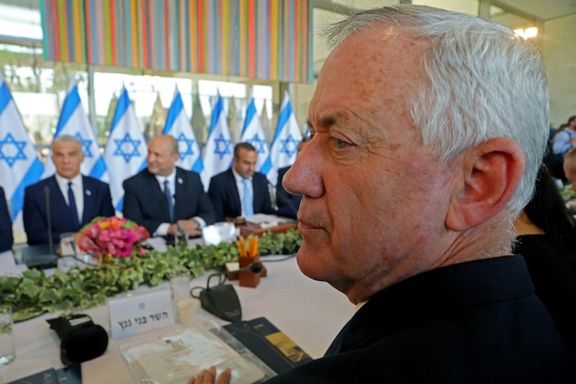
Israel was responsible, the Wall Street Journal reported Wednesday, for air strikes near Abu Kamal, Deir Ezzor province, eastern Syria, Tuesday/Wednesday night targeting a convoy suspected of carrying Iranian weapons. At least 14 people were killed, according to the Syrian Observatory for Human Rights.
Iraqi officials and Iranian media have said the tanker convoy was carrying fuel sent by Iran to Lebanon, a long journey. The Journal cited an Iraqi border official that Iran sends one or two convoys a month to help with Lebanon’s chronic power shortages and that Tuesday morning, a convoy of 22 vehicles had been in the Iraqi border town of al-Qaim, waiting to cross.
‘Trucks loaded with weapons and oil..’
Since retaken 2017 by the Syrian army with Russian air support from the Islamic State (ISIS) group, Abu Kamal, also known as Al-Bokamal and 4km from the Iraqi border, has been a shipment hub used by Iraqi militia allied to Iran. The border crossing to Al-Qaim, in Anbar province, reopened 2019.
Iranian state television attributed Tuesday night’s attack to a United States drone. The Syrian Observatory for Human rights (SOHR) said US aircraft had been flying low in the vicinity, but a spokesman for the US military said its forces had not been involved.
SOHR said aircraft had hit “trucks loaded with weapons and oil tanks of Iranian-backed militias in the customs square in Al-Hari and the military gate in Al-Bokamal countryside,” and a separate “military site of Iranian-backed militias near the area.”
SOHR said of at least 14 dead, most were “Iranian-backed militiamen,” and that due to serious injuries the toll was likely to rise. Israel had carried out frequent air strikes in Syria it says have disrupted arms supplies to the Lebanese group Hezbollah. SOHR reported Thursday heightened security among Hezbollah fighters near the Syrian border town of Dimas, Rif Dimashq governorate, south-west Syria adjoining Lebanon.
Violence in Syria continued this week with Russian jets striking caves and dens held by Isis fighters in Al-Rusafah desert, Al-Raqqah governorate. SOHR reported Thursday Syrian army firing rockets in the ‘Putin-Erdogan area,” the supposedly de-escalated region from the Latakia mountains to Aleppo’s suburbs, while Turkish and Kurdish forces traded shellfire in Aleppo governorate.